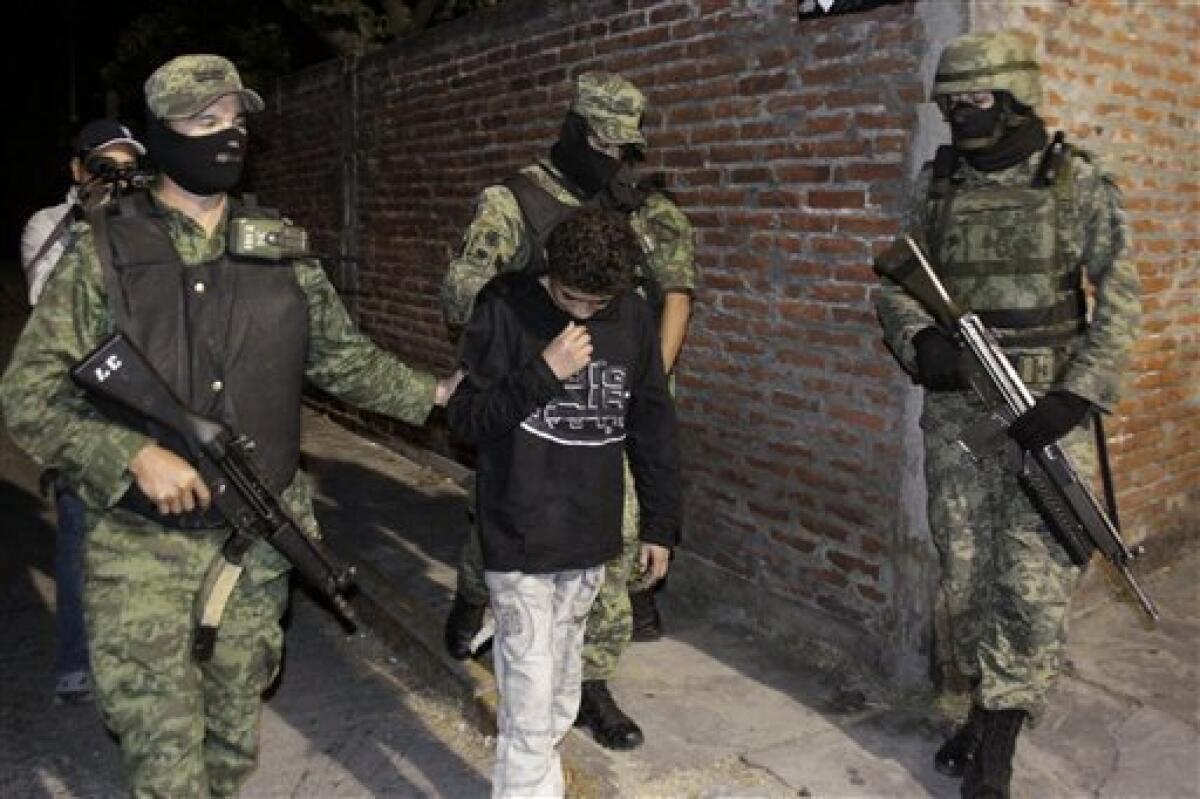Teen assassin to be set free

Three years after his arrest for beheading four young men on behalf of a drug gang in central Mexico, a San Diego-born teenager is preparing to walk out of juvenile detention next month.
Edgar Jimenez Lugo’s destination is uncertain, given fears that violent reprisals could await him at his former home in a working-class village south of Mexico City, where he arrived as a toddler from San Diego and fell into crime on the cusp of adolescence.
A request by Edgar to serve out his sentence in the United States, submitted earlier this year, was never endorsed by U.S. authorities.
That has left Mexican and U.S. officials to weigh the appropriate response to concerns about what comes next for the 17-year-old whose birth certificate confers the rights of U.S. citizenship.
The governor of Morelos, the state where Edgar is being held, wants him sent to the United States when his sentence is completed on Dec. 3.
“We have 13 days to see if he can be deported to the United States so that he can be placed in an institution there,” Gov. Graco Ramirez told a radio station in Mexico on Thursday. “He is an American citizen.”
U.S. consular officials have visited Edgar during his detention, according to his family. Officials at the U.S. Embassy in Mexico City declined Friday, as they have in the past, to respond to inquiries about Edgar’s release and their obligation to him as a U.S. citizen.
Related series
Edgar was 14 in August 2010 when he killed the young men — a student, a cook at a university, a gas station attendant and a small-business owner. Their bodies were mutilated and strung from a bridge in Cuernavaca, a tourist destination just south of Mexico City.
Graphic online videos that talked of a boy assassin named “El Ponchis” — Edgar’s nickname — emerged and the search was on for the teen.
That December, soldiers arrested the boy at an airport near Cuernavaca as he and an older sister waited for a flight to Tijuana.
They were planning to reunite with their mother, Yolanda Lugo Jimenez, in San Diego. She was arrested days later in Barrio Logan on immigration violations and deported this past April. Her whereabouts now are unclear.
View the Video A boy and the cartels
Edgar was convicted in juvenile court in July 2011 of homicide and organized crime charges, and sentenced to three years in custody, the maximum allowed. With time served before his conviction, he’s now due for release.
Once freed, Edgar will face no clear legal obstacles to crossing into the United States, said Guadalupe Valencia, a San Diego criminal defense attorney with extensive experience in immigration and extradition proceedings.
“He can come live here when he turns 18 (in May) without any supervision. The U.S. can’t do anything, and Mexico cannot do anything. ... He wasn’t charged with conspiracy in the U.S.,” Valencia said.
While he’s a minor, if Edgar returns to the U.S. with no parent or guardian living here and no place to live, he could potentially be placed in government foster care, said Candi Mayes, executive director of Dependency Legal Group of San Diego, a nonprofit that provides legal counsel to children in the system.
Housing, education and other benefits designed as a transition to independent living for foster care youths can be extended in some circumstances through age 21 under a law adopted last year in California.
There would no public disclosure if Edgar were taken into the foster care system because of privacy restrictions.
Edgar already has passed through foster care in the U.S. — as a baby.
He was born at Paradise Valley Hospital in National City in 1996 to drug-addicted parents who had illegally immigrated to San Diego. The parents lost custody of Edgar — and eventually his five siblings — when he had cocaine in his system at birth.
His paternal grandmother adopted him and his siblings, taking them in 1997 to live in Tejalpa, a village on the outskirts of Cuernavaca. His father, David Antonio Jimenez Solis, also returned there after being ordered out of the United States following an arrest on drug charges in San Diego County.
After the grandmother’s death in 2004, Edgar dropped out of elementary school and mostly fended for himself, falling in with a drug-trafficking crew that operated in Morelos.
Because of his criminal background, his family in Mexico fears his return could also put them at risk.
In recent weeks, his case and pending release has received intense media attention locally. A book bearing Edgar’s image on the cover was released last month. It included his former street address.
Juvenile justice officials in Mexico concede they have no government-sponsored protective services, supervision or counseling for young criminals who leave detention after completing their sentences.
“We don’t have a place that is set aside especially for adolescents that have been in legal trouble that can provide any kind of refuge and continued treatment,” said Rosalia Martinez de Leon, the judge overseeing sentencing at the Morelos juvenile court system.
morgan.lee@utsandiego.com (619) 293-1251
